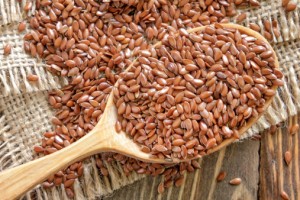Flax seeds: benefits and uses
 For over 6,000 years humans have been consuming flax seeds. Deemed a superfood, flax seeds grow from a plant which produces a beautiful blue flower. This plant can grow in both tropical and subtropical climates.
For over 6,000 years humans have been consuming flax seeds. Deemed a superfood, flax seeds grow from a plant which produces a beautiful blue flower. This plant can grow in both tropical and subtropical climates.
The fruit pod which is grown contains either golden-yellow seeds or brown seeds. Regardless of their color, flax seeds aren’t called superfoods for just any reason – they pack a nutritional punch to boost health.
Flax seed nutrition
Let’s examine one ounce (three tablespoons) of flax seeds for its nutritional contents.
Omega-3 (ALA) 6,338mg
Fiber 8g
Protein 6g
Vitamin B1 31% Recommended Daily Allowance (RDA)
Manganese 35% RDA
Magnesium 30% RDA
Phosphorus 19% RDA
Selenium 10% RDA
Flax seeds also contain good amounts of vitamin B6, iron, potassium, copper and zinc. As you can see, in such a small serving you already get many of your daily nutritional requirements.
7 Amazing Health benefits of flax seeds
With its fantastic nutritional content it should be of no surprise that flax seeds can add benefits to your health. Here are a few ways you can boost your health with the benefits of flax seeds.
Weight loss: Research has shown that flax seeds can benefit weight loss. Flax seeds contain healthy fats as well as fiber. Not only will you feel satisfied longer, but you will consume fewer calories throughout the day. Furthermore, fiber keeps you regular, promoting normal bowel movements and reducing constipation which can contribute to weight gain.
Cholesterol: Not only does fiber keep us full and regular, but it can also benefit our cholesterol. Found in the journal Nutrition and Metabolism, enjoying flax seeds can benefit your cholesterol by naturally lowering it.
Gluten-free: Gluten is a common allergy, especially for people who have celiac disease. Flax seed does not contain gluten, making it safe to eat for the majority.
Antioxidants: Antioxidants fight off free radical damage which can impair vision, lead to wrinkles and mess with hormones. Flax seeds contain high levels of antioxidants which work to benefit your skin, hair, eyes and cells.
Digestion: Fiber and alpha-Linolenic acid (ALA) work together to improve digestion. Not only do they help you stay regular, but ALA, in particular, works to protect the lining of the gastrointestinal tract.
Heart health: Nutrients in flax seeds can help maintain healthy blood pressure and may prevent hardening of arteries.
Diabetes: Nutrients in flax seeds can help regulate blood sugar levels.
How to enjoy flax seeds
If you’re ready to receive the health benefits associated with flax seeds, here is how you can enjoy them.
Ground up and toasted flax seeds can easily be added to just about anything. Here is a list of foods you can add flax seeds to:
- Smoothies, shakes
- Yogurt
- Cereal
- Dessert
- Salad
- Ice cream
- Baked goods
Just add a sprinkle, a teaspoon or even a few tablespoons for added sweetness and health benefits to any meal.
Side effects and caution of flax seeds
Generally speaking, flax seeds are safe for anyone to consume. It is important to note that flax seed fiber content may increase trips to the bathroom. Fiber can also lead to bloating, gas, and abdominal pain; to combat this ensure you are drinking plenty of water.
Concerns arise in those who take medication to lower blood sugar or blood pressure. Because flax seeds have the ability to lower these numbers further, people in this category should not over consume flax seeds or speak with their doctor first.
Flax seeds are enjoyable and can add many benefits to your health. If you haven’t tried them yet, start incorporating them slowly into your diet to begin feeling better.
Guide to antinutrients in food
Nutrients are found in food which gets used by the body to stay healthy and perform its many functions. But on the other hand, there are nutrients found in food, specifically plants, which are not digested; these are called antinutrients. Continue reading…
-
Use Green Tea To Aid Weight Loss
Green tea weight loss diets have been ac
-
3 Better Ways To Lose Weight (Or Reach Any Goal)
-
Can Regular Massages Help You Lose Weight?
A lot of people who have trouble losing weight by following the tradit
-
Weight Loss - Fat Loss - Quick Weight loss - Weight Loss Diet - How to Lose Weight
It should be noted that a proper diet is
-
What Can I Know for Certain?
If we have fallen into the behaviour of overeating, restricting or
-
Are You Willing To Make Your Body Healthy?
If youre like most, then you possess began in addition to ceased a num
- DON'T MISS
- The Importance Of Weight Loss Program
- The Lose Weight Fast Formula For Dropping 5 Pounds In 7 Days... Guaranteed!
- Little Changes Add To Weight Loss, Part 2
- How To Lose Belly Fat With Natural Medicine
- Hoodia Cactus
- The Cabbage Soup Diet Summarized
- Apple Cider Vinegar Dieting – Exposed!
- How Visualization Helped Me Lose 220 Pounds
- Try this simple fix to lower cholesterol
- Lose Weight by Working Out in the Morning




